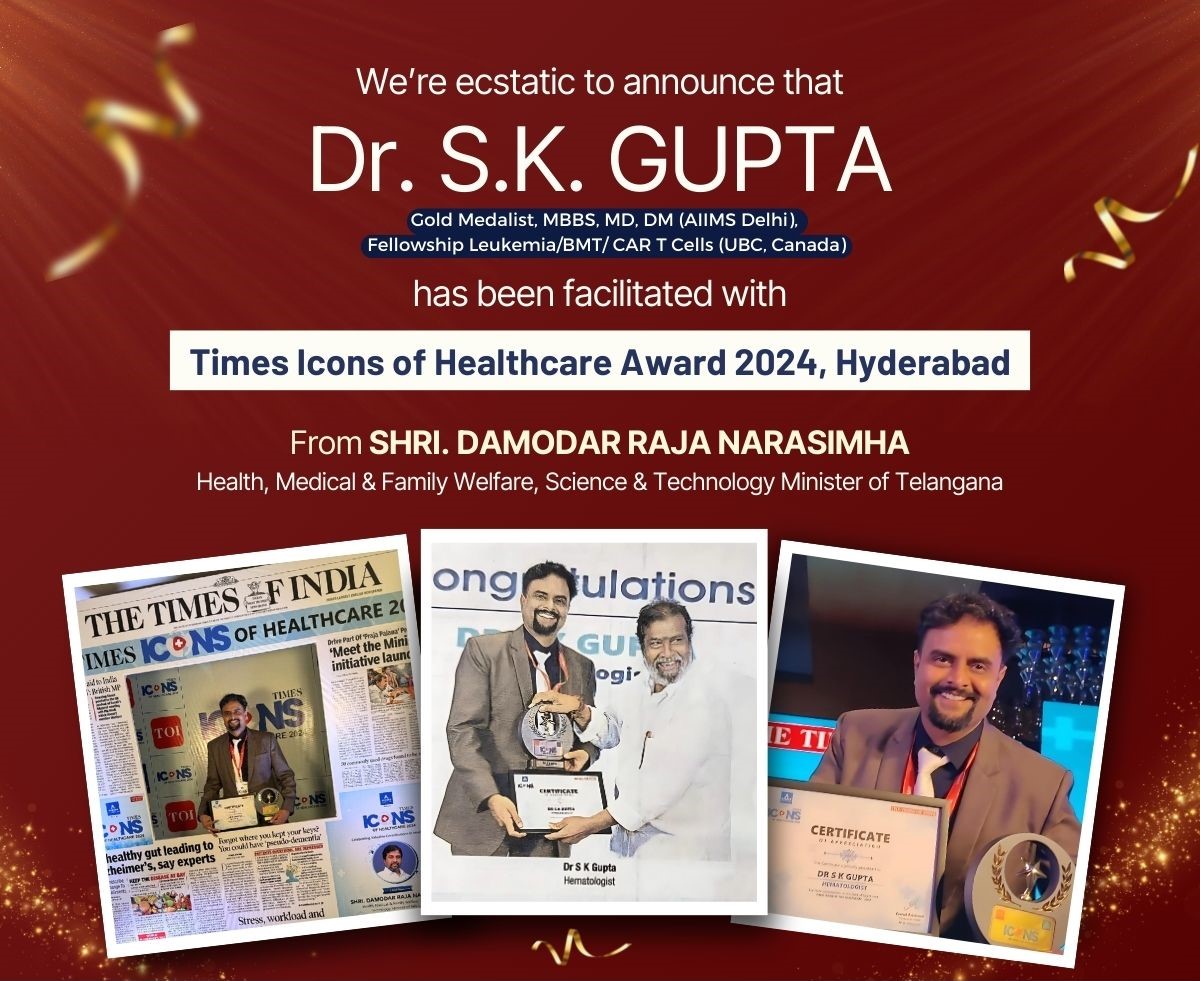Comprehensive Hematology Services
Full-range care for blood disorders, from diagnosis to treatment.
Specialized Hematooncology Care
Tailored treatment for blood cancers like leukemia and lymphoma.
Advanced Bone Marrow Transplant Expertise
Leading-edge care for bone marrow transplant patients
Best Hematologist in Hyderabad
Dr. S K Gupta, highly skilled expert in the fields of Hematology, Hemato-Oncology, and Bone Marrow Transplantation. Dr. Gupta’s practice benefits from his extensive qualifications, which include MBBS, MD, DM from AIIMS Delhi, and Fellowship in Leukemia/BMT/CAR T Cells from UBC, Canada.
With expertise in blood and bone marrow transplant, he ensures to provide state-of-the-art care and compassionate attention. If you’re looking for top-notch medical expertise, don’t hesitate to book a consultation with Dr. S K Gupta.


Top Bone Marrow Transplant in Hyderabad
Fellowship Certificate in Leukemia/BMT/CAR T Cell Therapy (UBC, Canada)
Dr. S K Gupta holds a prestigious Fellowship Certificate in Leukemia, Bone Marrow Transplant (BMT), and CAR T Cell Therapy from the University of British Columbia (UBC), Canada.
This advanced training has equipped Dr. Gupta with cutting-edge knowledge and skills in the management and treatment of leukemia, the complexities of bone marrow transplantation, and the innovative applications of CAR T cell therapy. His expertise in these areas underscores his commitment to providing exceptional care and the latest treatment options to his patients.
Honored with the Times Icons of Healthcare Award 2024
Dr. S K Gupta has been honored with the prestigious Times Healthcare Icon 2024 award from Health, Medical & Family Welfare, Science & Technology Minister of Telangana, Shri Damodar Raja Narasimha, a recognition of his outstanding contributions to the field of hematology.
This award celebrates his clinical expertise, dedication to cutting-edge medical research, and his unwavering commitment to patient care.
Heartfelt gratitude to family, colleagues, mentors, and the entire healthcare team who have supported throughout career. And invaluable contributions of patients, who inspire every day to pursue excellence in medicine.

Our Services
Bone Marrow Transplantation
Procedure involving the replacement of damaged or diseased bone marrow with healthy stem cells.
Systemic Therapies
Treatments targeting cancer cells throughout the body, including chemotherapy, immunotherapy, and targeted therapy.
Multiple Myeloma
Cancer of plasma cells, impacting bone marrow and leading to bone damage and weakened immune function.
Blood Cancer
A general term encompassing cancers that affect the blood, bone marrow, and lymphatic system.
Anemia
Condition characterized by a deficiency of red blood cells or hemoglobin, resulting in fatigue and weakness.
Coagulation & Bleeding Disorders
Conditions affecting the blood’s ability to clot properly, leading to excessive bleeding or clot formation.
Our Services include
- Leukemia (ALL, AML, CLL, CML)
- Lymphoma
- Myeloma
- MDS
- Blood Cancer
- Myelofibrosis
- Mastocytosis Services
- MGUS
- Pancytotenia
- Aplastic Anemia
- ITP, TTP, FNAIT, AIHA,PNH
- Thalassemia
- Sickle Cell Anemia
- DVT
- Bleeding and Clotting disorders
- Recurrent Infections
- Recurrent Abrotions
- Multiple Sclerosis
- ALPS
- Unexplained high or low Hb
- Platelets & WBC
- IgG4-RD
- Immunodeficiency
- Storage Disorders
- Hemophagocytic Syndrome (HLH)
- LCH
- Hemochromatosis
- Porphyrias
- VEXAS Syndrome
- Erdheim Chester Disease
- Autologous
- Allogeneic
- Unrelated
- Half Matched Transplant
- CAR T- Cells
- Immunotherapy
Patient Information
Hemoglobin is a protein in red blood cells that binds to oxygen in the lungs and carries it to tissues throughout the body. It also helps transport carbon dioxide from the tissues back to the lungs for exhalation.
The CBC test is a common blood test that provides important information about the types and numbers of cells in the blood, including red blood cells, white blood cells, and platelets. It can help diagnose a variety of conditions, such as anemia, infection, inflammation, and blood disorders. The CBC results, along with other tests and clinical findings, aid in the diagnosis and monitoring of patients with hematological disorders.
A bone marrow biopsy involves the removal of a small sample of bone marrow tissue for examination under a microscope. It is performed to diagnose various blood disorders, such as leukemia, lymphoma, anemia, and certain infections. It provides information about the composition of the bone marrow, including the types and numbers of blood cells being produced.
Common symptoms of anemia include fatigue, weakness, pale skin, shortness of breath, dizziness or lightheadedness, cold hands and feet, and headaches. Severe anemia may also cause chest pain, rapid heartbeat, and cognitive problems.
Benign hematological disorders are non-cancerous conditions that affect the blood or bone marrow, such as anemia or thrombocytopenia. Malignant hematological disorders, on the other hand, are cancers that originate from blood-forming tissues, such as leukemia, lymphoma, or multiple myeloma. Malignant disorders involve uncontrolled growth and proliferation of abnormal cells.
Risk factors for hematological cancers include genetic predisposition, exposure to certain chemicals or radiation, immune system disorders, viral infections (such as Epstein-Barr virus or human T-cell leukemia virus), and some inherited conditions (like Down syndrome or certain types of anemia).
Treatment for hematological cancers depends on the specific type and stage of the disease but may include chemotherapy, radiation therapy, targeted therapy, immunotherapy, stem cell transplantation, and/or surgery. The treatment approach is often tailored to individual patients based on factors such as age, overall health, and genetic markers.
Molecular testing, such as cytogenetic analysis and next-generation sequencing, plays a crucial role in the diagnosis, prognosis, and treatment selection for hematological cancers. It helps identify specific genetic mutations or chromosomal abnormalities that drive cancer growth, allowing for more precise treatment strategies, including targeted therapies.

